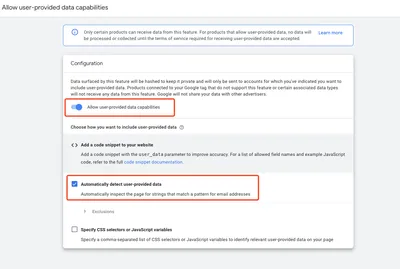Imminent Google Tag updates: What nonprofits should know
From 10th April 2025, Google will start automatically deploying a Google tag to your website if your Google Tag Manager (GTM) container uses Google Ads or Floodlight tags.
This update is designed to make tracking more reliable, but it could result in your users' personal data being unintentionally sent to Google.
Here's what's changing and what you need to do.
What’s changing?
From 10 April 2025, if you're using any Google Ads or Floodlight tags in Google Tag Manager (GTM), your container will automatically load a Google tag before any events are sent.
While GTM has technically been doing this already - loading the gtag.js library behind the scenes - those automatically loaded tags previously had key settings disabled by default.
With this update, the Google tag will inherit all the settings configured in your Google Tag setup. This includes features that affect how data is collected, such as user-provided data and automatic event detection.
Why is this happening?
Google is making this change to improve the reliability of tracking and to ensure that important Google Tag features are enabled by default - particularly in cases where they may have previously been unintentionally inactive.
By standardising how the Google tag is loaded and configured, this update is designed to:
- Enable one-click access to features like enhanced conversions
- Support smoother data collection
But it’s important to understand what this really means for nonprofits.
Collecting user-provided data
While the update doesn’t automatically switch on data collection across your setup, the Google tag will now inherit settings from your Google Ads configuration.
From 10th April 2025, the auto-loaded Google Tag can start collecting personal data from your website, and pass that data to Google with no additional setup in GTM or on your website. This could occur if user-provided data collection (e.g. data from form fields like name or email) is enabled in your Google Ads account, and you have turned on enhanced conversions.
Enhanced conversions are a feature that you may use to improve your conversion measurement, if your organisation has thoroughly reviewed Google’s data policies, and has made an informed decision to do so.
But with this change, there is a risk that you may unintentionally start collecting and sharing personal data - especially if settings were enabled at some point during testing or setup and then forgotten about.
In our experience, many of our clients aren’t aware that the tracking tags they’ve been using for years have gradually evolved into tools capable of extracting user-provided data from their websites. This is even more critical for organisations working in sensitive areas such as health, human rights, or crisis support, where protecting user privacy is essential.
That’s why we’re highlighting this change: to help you stay in control of what data is collected and ensure your tracking setup aligns with your values and responsibilities.
Do you need to take action?
Yes - we recommend reviewing your Google Tag setup now if you’re using any Google Ads or Floodlight tags in GTM.
In Google Ads, go to Goals > Conversions > Settings and check that enhanced conversions are switched off:

Next, go to Tools > Data Manager, open the Google Tag and then allow user-provided data capabilities menu.
From here you can completely disable the tags’ ability to automatically collect user-provided data from the website.

We recommend turning all of these settings off if you are not actively using them in the account and don’t plan to collect user-provided data.

We're here to help
If you would like help with anything mentioned above, please get in touch.
Olly White Head of Measurement & Impact
Get in touch


